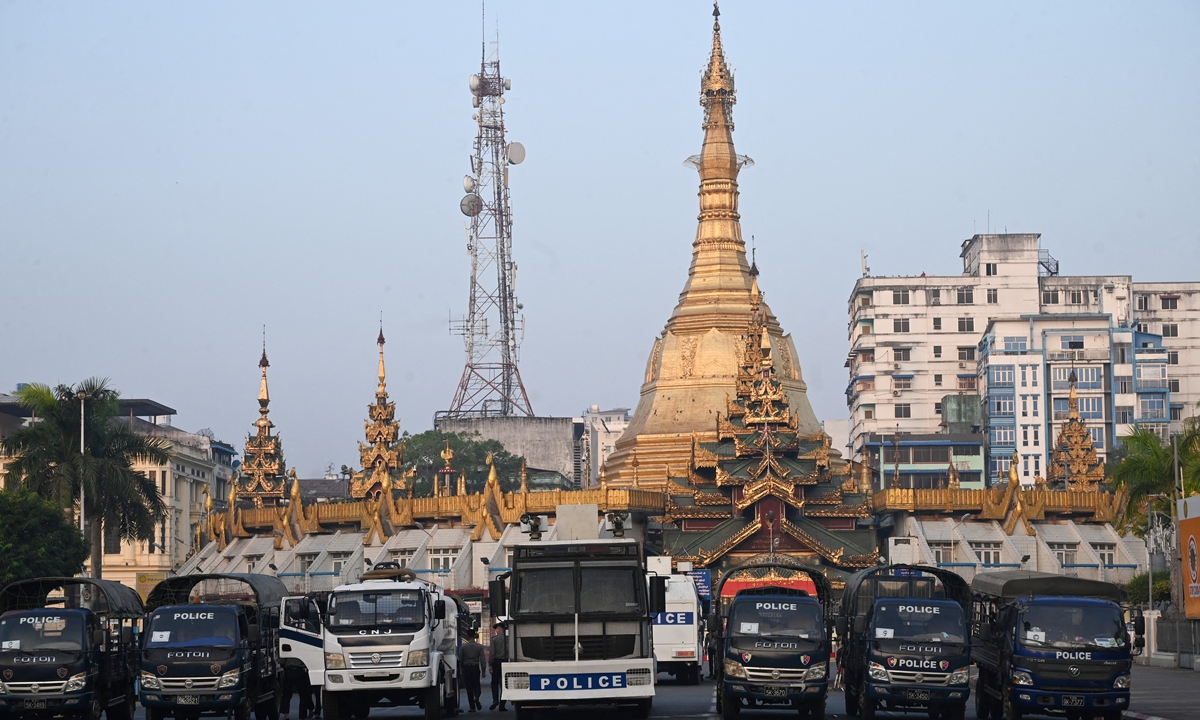
Police vehicles barricade a road outside Sule Pagoda, next to Yangon City Hall in Yangon, Myanmar on February 16. Photo: AFP
The Australian Strategic Policy Institute (ASPI) has, for a long time now, discredited itself by acting as a malign and "rogue" instrument of the ultra-right political forces in Australia.
Financed not only by Australia's Department of Defence and the Australian intelligence organization, Australian Signals Directorate, this self-proclaimed "independent" think tank has also been a ravenous recipient of lavish funding from the State Department of the US and a long list of international arms dealers. On numerous occasions, it has been zealously serving as a raucous mouthpiece of anti-China cliques in Australia and elsewhere in the West, oftentimes providing munition for the scare and smear campaign launched from Washington.
Its habitual practice of fabrication and rumor-mongering has been disruptive and injurious to bilateral relations between China and Australia, which in recent years have crumbled to the current state of ruinous shambles.
The latest piece of disinformation manufactured by ASPI was recently posted on its website publication, the Strategist, with the lurid title, "What's on the clandestine nightly flights between Myanmar and China?" It is filled with guileful fabrications, mischievous innuendoes and baseless allegations, with the vile purpose to slander China of secretly supporting Myanmar's present military authorities, the Tatmadaw, after the domestic incident in Myanmar in early February.
The article once again adopts ASPI's tactics of deceit. It cunningly uses open and freely available information, such as flight carrier numbers and routes between Kunming and Yangon, and deceptively blends it with outright lies and unsubstantiated conjectures with the aim of misleading its readers to its calculated and prescribed conclusions of some sensational conspiracy between China and Myanmar's military.
There is no evidence to support ASPI's delusive insinuations that the flights from Kunming carried "Chinese troops and cyber specialists" or weaponry. However, without any moral constraints and academic ethics, it was almost effortless for ASPI's mendacious "experts" to create a tall tale that China is working with the Tatmadaw to control and suppress the flow of information in Myanmar and stocking up the military's arsenal.
The article then goes further to cite Myanmar's domestic turmoil with the Rohingya minority to allude, once again, with no concrete evidence at all, that China had played a crucial part by supplying weapons or ammunition to the Myanmar army.
Russia, expectedly, was also mentioned as an active collaborator with the Myanmar military so as to provoke the readers to deduce China-Russia collusion to interfere with the internal politics of Myanmar.
China is one of Myanmar's closest neighbors and most important partners. As a participant of China's Belt and Road Initiative, political stability and economic prosperity in the Southeast Asian country is unquestionably in China's key national interests.
As a matter of fact, those who in reality aspire to intrude and meddle with Myanmar's politics are some malign forces in the West. Some Western countries have been coveting a political reshape or even revolution of Myanmar, to remould it to comply with their strategic intentions. There had been a profound disappointment in the West at Myanmar's increasingly friendly and constructive relationship with China under the leadership of Aung San Suu Kyi. The political upheavals and unrest in Myanmar seemed to provide a godsent opportunity to the anti-China forces in the West to steer the former British colony onto a more pro-West course.
As a political bludgeon of the anti-China forces in the West, ASPI has ferociously jumped at the chance created by the recent unrest in Myanmar not only to attempt to harm the reputation of China, but also try to instigate the China threat theory in Myanmar so as to distance the local community from its traditionally warm and closest neighbor.
Although it has no academic credibility as an independent think tank in a true sense, ASPI has been calculatingly referred to by some media outlets and ill-intentioned political figures in Australia and elsewhere as some sort of authority of China so that they can stoke up hostility among the general public and governments. Disinformation and fake news have been cited as credible academic sources to scare and misguide the people, with the ultimate aim of influencing future policies and even legislations at the federal government level.
"[P]ast behaviour is a predictor of future behavior," says that recent article by ASPI, disparaging China-Myanmar relations. We acknowledge the truth in this remark, so that the world shall be constantly vigilant of the lies and fibs told by those who disguise themselves as so-called China experts.
The author is a professor and director of the Australian Studies Centre, East China Normal University. opinion@globaltimes.com.cn
